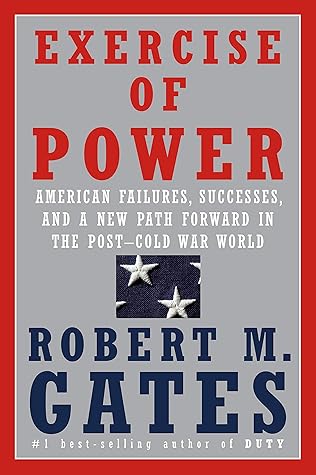More on this book
Kindle Notes & Highlights
Read between
September 11 - October 12, 2020
As we look to the future, perhaps the most important nonmilitary instrument of power is a long-range strategy for waging this competition. The Chinese have one. The United States does not.
Franklin D. Roosevelt was explicit about the importance of presidents “persuading, leading, sacrificing, teaching always, because the greatest duty of a statesman is to educate.”
Soldiers observe wryly that the unique selling point of their profession is that they kill people. It is too much to ask of most that they should resolve political and social challenges beyond their…experience, conditioning and resources.”
Defense Secretary Caspar Weinberger offered six such criteria, drawing upon our experiences in Vietnam and in 1983, the loss of 241 Marines in Beirut: (1) the U.S. should not commit forces to combat unless the vital national interest of the United States or its allies is involved; (2) U.S. troops should be committed wholeheartedly and with the clear intention of winning—otherwise, troops should not be committed; (3) U.S. combat troops should be committed only with clearly defined political and military objectives and with the capacity to accomplish those objectives; (4) the relationship
...more
Known as the Powell Doctrine, its varied iterations posed several questions that needed to be answered affirmatively before the United States took military action: Is a vital national security interest threatened? Do we have a clear, attainable objective? Have the risks and costs been fully and frankly analyzed? Have all other nonviolent policy means been fully exhausted? Is there a plausible exit strategy to avoid endless entanglement? Have the consequences of our action been fully considered? Is the action supported by the American people? Do we have genuine broad international support?
Major General Fox Connor: Never fight unless you have to, never fight alone, and never fight for long.
do not advocate leaving any of these institutions; indeed, as I’ve said, I think it was a strategic mistake for President Obama not to join China’s Asian Infrastructure Investment Bank and for President Trump to leave the Trans-Pacific Partnership.
For too long, Congress has ceded its powers in foreign policy to the executive branch. That the president could undertake military operations throughout the Middle East in 2019 based on the Authorization for the Use of Military Force passed by Congress on September 18, 2001, is absurd and a genuine dereliction of duty to the Constitution. Congress’s refusal to get out of the foxhole is partly due to deep partisanship and a determination by each party not to go against a president from that party. Also, Congress is loath to outright deny the president the authority to act, because that would
...more
The irony is that the more uncomfortable Congress has become with U.S. military engagement around the world, the more it has constrained our nonmilitary instruments of power.
Finally, Congress needs to fix itself (in many ways). The current committee structure in both houses ensures that members look at each component of the national security enterprise in isolation—the Armed Services Committees for Defense, the Foreign Affairs and Foreign Relations Committees for State, the Intelligence Committees for the CIA and other agencies. Even in the House and Senate Appropriations Committees, there are subcommittees for each of those components with hardly anyone looking at the big picture.
It ought not be the role of the American military to try to shape the future of other countries. The power of our military’s global reach has been an indispensable contributor to peace and stability in many regions and must remain so. But not every outrage, every act of aggression, every oppression, or every crisis can or should elicit an American military response. We must be realists about the limits of our military to bring about enduring reform and determine the political future of others. That said, our ideology is fundamental to America’s role in the world, keeping alive the belief among
...more
People around the world must know that America stands on the side of liberty and human dignity, despite whatever compromises we make to protect our interests. If we abandon that role, we will lose that which makes us historically unique. We will lose some piece of our national soul.
Americans, I think, understand the value of allies and how they are a unique asset for the United States, especially compared to both Russia and China, neither of which have any. At the same time, those allies are expected to pull their weight.
We must not be the world’s policeman, and we must be very cautious about deploying our military forces to resolve others’ internal problems. But we must also use every nonmilitary instrument of power we possess to promote freedom and encourage reform, with friends as well as rivals, because these objectives serve our national interest.


